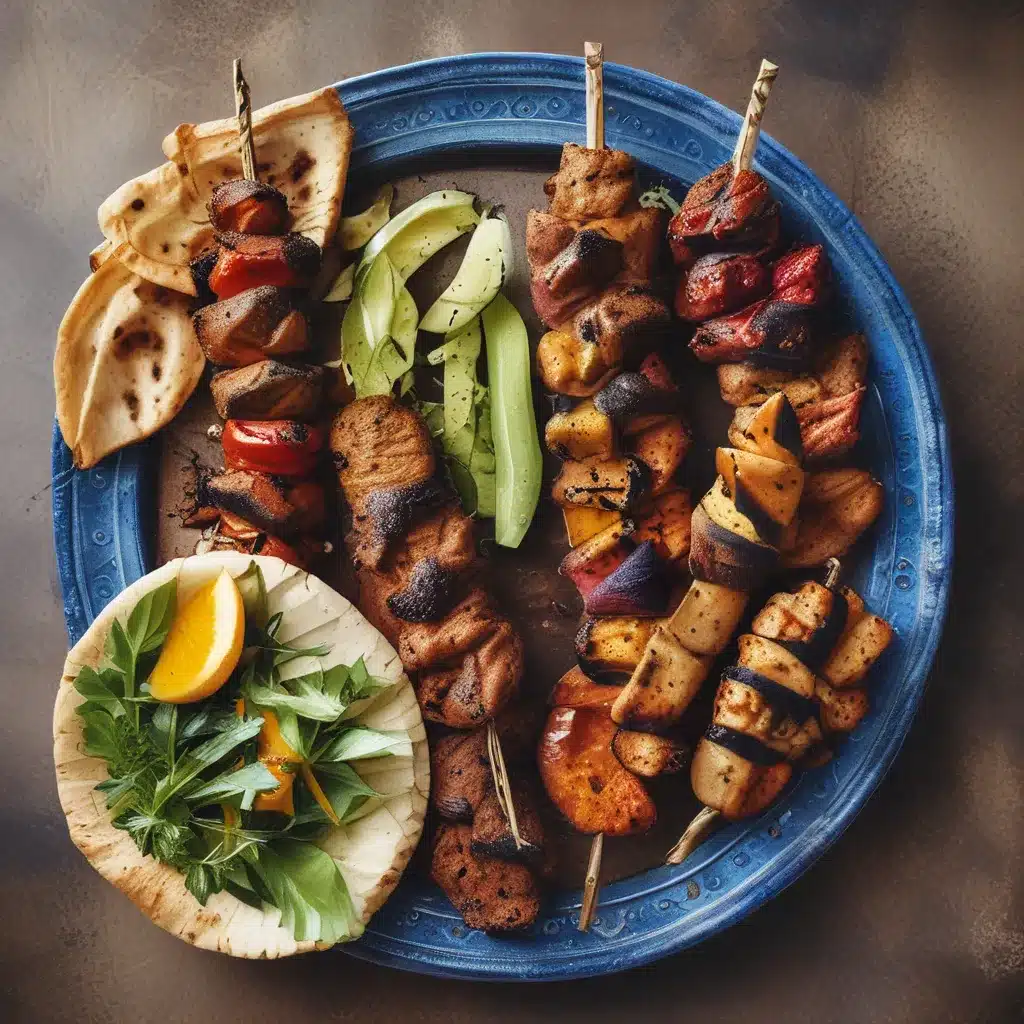
Discovering the Spice-Infused Wonders of Moroccan Cuisine
As I stepped through the vibrant doors of El Bahia, a Moroccan restaurant nestled in the heart of New York City, the tantalizing aromas of spices and sizzling meats immediately captivated my senses. I knew I was about to embark on a culinary adventure that would transport me to the bustling souks and sun-drenched landscapes of North Africa.
The menu boasted an array of tantalizing Moroccan kebab plates, each one promising a symphony of flavors that would dance on my tongue. I couldn’t wait to dive in and uncover the secrets behind these iconic Moroccan dishes.
Exploring the Art of Moroccan Kebab Preparation
As I began to delve into the history and technique of Moroccan kebab-making, I was struck by the level of care and attention that goes into each and every skewer. The process, I learned, is a true labor of love, requiring both skill and patience.
The foundation of a great Moroccan kebab lies in the marinade. Chefs at El Bahia carefully curate a blend of aromatic spices, including harissa, cumin, coriander, and smoked paprika, to infuse the meat with a bold, smoky-sweet flavor profile. The protein, whether it’s succulent lamb, tender chicken, or juicy beef, is then left to soak up the flavors, transforming into a canvas for the chef’s culinary artistry.
But the magic doesn’t stop there. The skewered meats are then meticulously grilled over hot coals, creating a delightful char that seals in the juices and imparts an irresistible smokiness. As the kebabs sizzle and caramelize, the air is filled with a fragrance that is both alluring and mouthwatering.
Infusing Moroccan Flavors into Vegetarian Dishes
While Moroccan cuisine is renowned for its aromatic meats, the talented chefs at El Bahia have also mastered the art of crafting delectable vegetarian kebab plates. Taking a cue from the vegan Moroccan-spiced sheet pan tofu and sweet potatoes recipe, they have developed a range of plant-based options that are equally as satisfying as their meat-based counterparts.
Juicy cubes of marinated tofu and tender roasted sweet potatoes are skillfully skewered and grilled to perfection, imbued with the same captivating blend of Moroccan spices. The result is a harmonious balance of flavors, where the smoky, savory notes of the marinade mingle with the natural sweetness of the vegetables.
But the real showstopper, in my opinion, is the lemon-cilantro aioli that accompanies these vegetarian kebabs. This creamy, tangy sauce adds a bright, refreshing element that cuts through the richness of the grilled ingredients, creating a truly well-rounded and satisfying dining experience.
The Art of Plating and Presentation
As I eagerly awaited the arrival of my Moroccan kebab plate, I couldn’t help but admire the meticulous attention to detail that went into its presentation. The chefs at El Bahia understand that the visual appeal of a dish is just as important as the flavors it delivers.
Each plate was a work of art, with the skewered meats or vegetables artfully arranged atop a bed of fragrant basmati rice. Vibrant bursts of color came from the addition of roasted vegetables, such as bell peppers and zucchini, while a generous sprinkling of fresh herbs, like cilantro and parsley, added a touch of verdant elegance.
But the true pièce de résistance was the drizzle of that irresistible lemon-cilantro aioli, cascading over the kebabs and infusing every bite with a tantalizing creaminess. It was a feast for the senses, and I found myself eagerly anticipating each and every morsel.
Discovering the Versatility of Moroccan Kebabs
As I savored each mouthful of the Moroccan kebab plate, I was struck by the sheer versatility of these beloved dishes. They could seamlessly transition from a casual weeknight dinner to a showstopping centerpiece for a formal gathering, catering to a wide range of dietary preferences and palates.
For those seeking a heartier, more indulgent experience, the grilled harissa chicken kebabs, with their smoky-spicy marinade, were an absolute delight. The tender, juicy meat paired perfectly with the aromatic rice and roasted vegetables, creating a satisfying and well-balanced meal.
But for those looking to explore the plant-based side of Moroccan cuisine, the vegetarian kebab plates were a revelation. The tofu and sweet potato skewers, with their complex blend of spices and the creamy lemon-cilantro aioli, proved that meatless dishes can be just as flavorful and satisfying as their carnivorous counterparts.
Embracing the Spirit of Moroccan Hospitality
As I savored the final bites of my Moroccan kebab plate, I couldn’t help but feel a deep sense of gratitude and appreciation for the culinary artistry on display. The chefs at El Bahia had not only crafted a delectable meal but had also immersed me in the rich cultural traditions of Morocco.
The essence of Moroccan hospitality, I realized, was woven into every aspect of the dining experience. From the vibrant, welcoming decor to the attentive service and the genuine passion of the staff, I felt truly welcomed and cared for, as if I were a cherished guest in a Moroccan home.
It was a testament to the power of food to bring people together, to transcend borders and cultural divides, and to create a shared experience of joy and connection. As I left El Bahia, I carried with me not only a full belly but also a heart brimming with the warmth and spirit of Moroccan cuisine.


